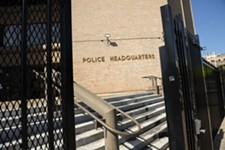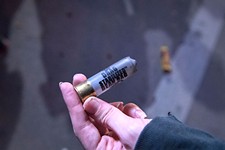Crime Lab Cover-Up?
APD admits to long-running wrongdoings with its evidence
By Chase Hoffberger, Fri., Sept. 23, 2016
The Austin Police Department held a late-afternoon press conference Friday to announce a late-afternoon Friday news dump kind of thing: The department's crime lab, shuttered since June after consultation with the Texas Forensic Science Commission and the American Society of Crime Lab Directors, didn't shut down voluntarily because a supervisor had succumbed to cancer. Rather, it closed after the FSC and ASCLD discovered a string of issues with the way APD was conducting DNA analysis – methods that may have affected a number of sexual assault trials in Austin over the past decade.
Much of what was covered by APD Chief of Staff Brian Manley on Friday has been detailed less deliberately before, both in a letter sent from the FSC to Police Chief Art Acevedo and Travis County District Attorney Rosemary Lehmberg on June 10 (see "APD's DNA Lab Shutters," June 17), and in a lengthy July audit issued by the commission. Most notable was news of a lab analyst's contamination of the penile swab of a person of interest in a sexual assault case (who was later excluded) with DNA from a vagina swab collected from the case's victim. Manley said Friday that the department believes the analyst "analyzed the source from the survivor of that assault at the same time that they looked at the source of the suspect," something that's "obviously not an appropriate practice."
The aforementioned audit indicates a number of instances in which ASCLD found APD's crime lab to have struggled with record-keeping and testing, in ways that potentially proved harmful to criminal cases. The lab's technical leaders weren't properly qualified: The audit notes how "some analysts struggled in responding to questions regarding foundational DNA topics." At least 10 reagent blanks (which are supposed to be clean and controlled substances) had been contaminated. Quality assurance programs were out of whack. Expiration dates on SERI Acid Phosphatase and directions to "make fresh daily" were being ignored, increasing the chance analysts could miss potential semen stains. The method of DNA study – the "quant-based stochastic threshold," a criteria used to determine if certain evidence should be amplified – has been considered "not scientifically valid." In fact, APD's was the only lab in Texas known to use that particular method.
Those findings lend credence to accusations made in 2010 and 2011 by Cecily Hamilton and Debra Stephens, two former lab employees, who raised questions about the lab's performance and testing standards – accusations discounted by the department as having come from an "angry former employee." (See "Another Charge of Negligence at APD's Crime Lab," Jan. 20, 2012.) The findings also bring into question why, when APD announced its shutdown in June, Acevedo led by saying the "voluntary" decision was the result of the death of an employee – only conceding ongoing conversations with FSC as a secondary reason. At the time, Acevedo said he'd been told "preliminarily" that the probability is low that an innocent person has been convicted as a result of APD's testing challenges. Asst. Chief Troy Gay doubled down on that assessment on Sept. 6 when he told members of the Public Safety Commission that the department and District Attorney's Office "have not located or identified any cases that have been impacted at this point."
The latter by now can be classified as an untrue statement: The contamination case specifically mentioned in the audit – flagged for contamination by the District Attorney's Office as early as 2009 – has still not gone to trial because of challenges at the lab. Any case that's been tried on DNA evidence processed through APD since April 2010, when APD adopted its stochastic threshold practice, could also be subject to retesting. As Acevedo noted when he first announced the shutdown, "only time will tell" how many other cases have been affected.
Got something to say on the subject? Send a letter to the editor.











